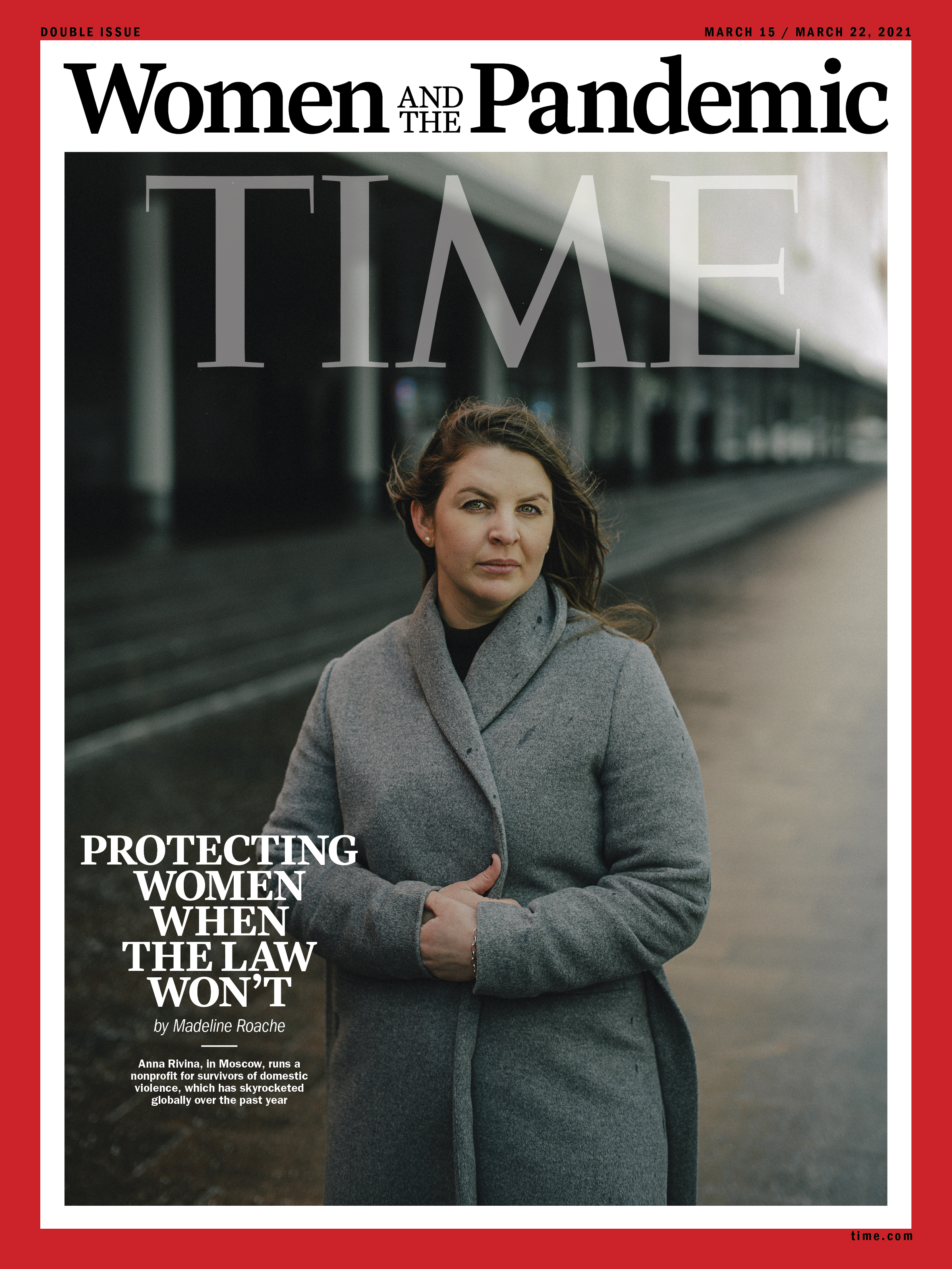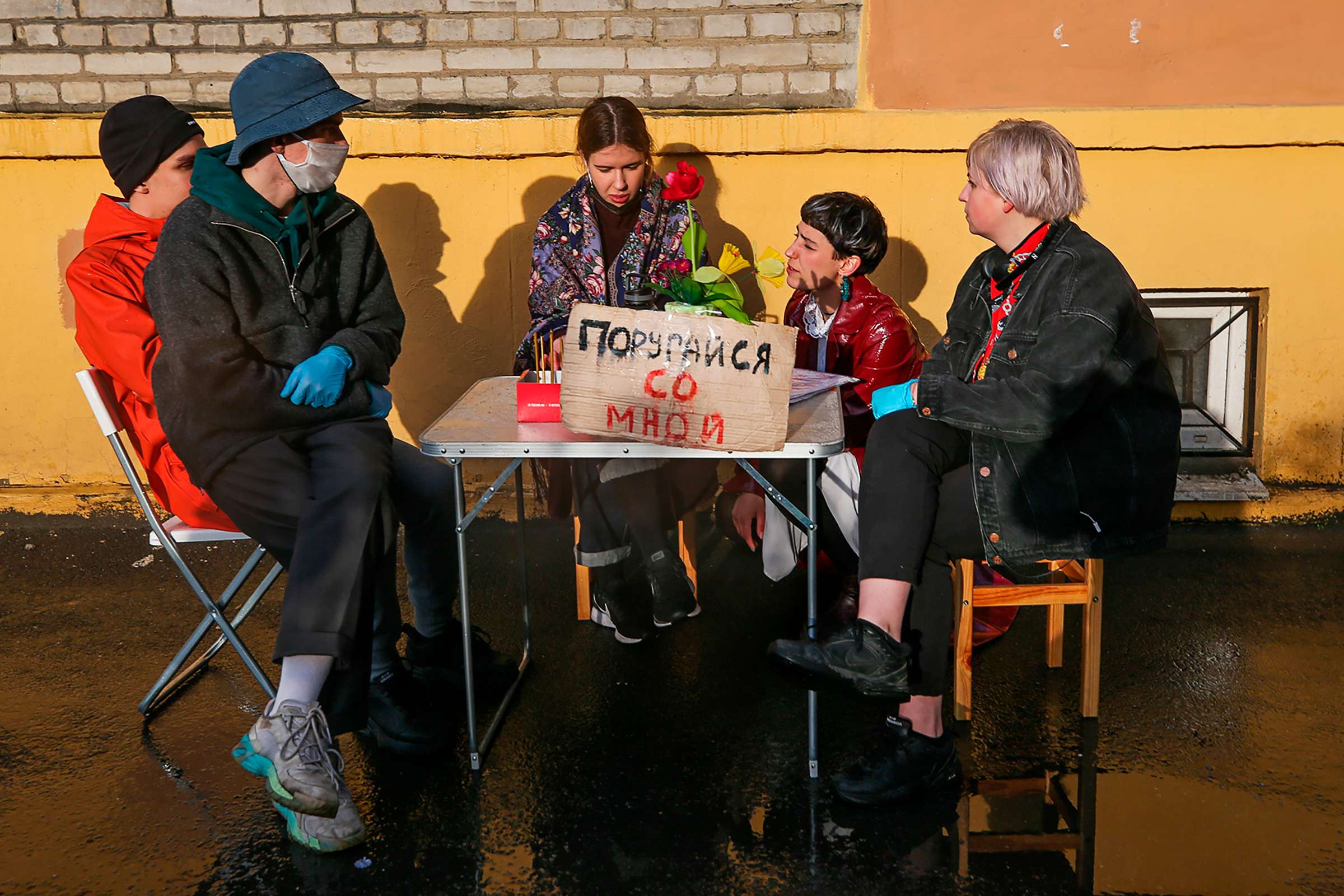As Nastya waits for her husband Kirill to come home from work, thoughts run through her head. She smooths the creases from the tablecloth and lays the table in the dimly lit kitchen of their apartment in Moscow, careful to place the knife and fork perfectly straight next to Kirill’s plate. “Sometimes he loses his temper, but no one’s perfect,” she thinks. “I can’t do anything right.”
When Kirill returns, he stares at the food his wife has prepared, then, when she asks what’s wrong, begins hurling insults. “You’re useless, even in the kitchen,” he says, becoming more aggressive as Nastya tries to reason with him, grabbing her and pushing her to the ground. She calls the police begging for help but knows they won’t come. When she calls her father, Kirill grabs the phone and convinces him everything is fine. “She’s just being dramatic,” Kirill says, pressing his hand over Nastya’s mouth to silence her.
Nastya and Kirill aren’t real—they are characters in an interactive exercise—but they might as well be. Game 116, as it’s called, was launched in 2018, but it’s perhaps even more relevant now than it was then. The exercise, which puts users in Nastya’s shoes and asks them to choose options to handle Kirill’s wrath, is an attempt to highlight domestic violence that activists say has soared in Russia during the pandemic.
That’s true around the world. As lockdowns trapped women at home with abusers, advocates and authorities report that calls for help from abuse victims doubled and tripled. In response, more than 120 countries have strengthened services for female survivors of violence during the COVID-19 crisis.

Russia is an exception, taking little concrete action. In April, the Kremlin denied that domestic violence was a problem and claimed it had decreased, even as Russian organizations reported they were struggling to keep up with a spike in calls for help. With shelters across the country closed because of the pandemic, some women were even fined for violating quarantine rules by fleeing their abusers. It wasn’t until May that the government declared domestic violence an emergency that allowed someone to break quarantine.
Though Russia has since lifted mandatory lockdowns, unemployment and economic despair sparked by the pandemic portend dangerous times ahead. “When a cycle of violence begins, it’s not going to go away just because the pandemic goes down,” says Marina Pisklakova-Parker, director of ANNA, one of the non-profits led by women that are working to fill the vacuum left by Russia’s failure to address the problem.
Game 116 is the brainchild of a Moscow advertising agency, Room 485, which created it in collaboration with women’s-rights activists, including Pisklakova-Parker and Anna Rivina of Nasiliu.net (its name, which is the same as its URL, translates to “no to violence”), another non-profit working on domestic violence. The name Game 116 comes from Article 116 of the Russian criminal code, which defines battery as causing “pain” but not resulting in physical damage.
The project was personal for many involved. The actor who portrays Nastya had left an abusive partner shortly before production began, while Sophya Katulska, a director at Room 485, who wrote the script, based it on her own experience in an abusive relationship. By forcing users to choose how Nastya reacts throughout the scenario and showing the outcome, Katulska says she wants to do away with the idea that “correct” behavior can stop abuse in a relationship.
That message is clear. No matter what Nastya does—crying, screaming for help, fighting back or apologizing—she cannot placate Kirill. He suffocates her with a pillow, strangles her or walks away, leaving Nastya to live in fear of his next outburst.
A fifth of all Russian women have been physically abused by a partner, and an estimated 14,000 women in the country die as a result of domestic violence each year—more than nine times the number of deaths in the U.S., though Russia’s population is less than half the size. At least 155 countries have passed laws criminalizing domestic violence. But in Russia, there is no such law; the government has even made it easier for domestic violence to go unpunished. In 2017, its parliament passed a law making any domestic violence that does not cause “significant injury”—defined as requiring hospital treatment—an administrative rather than criminal offense. First-time offenders can walk away with fines as low as 5,000 rubles ($88).
Since the fall of the Soviet Union in 1991, Russia’s government has failed to pass more than 40 draft laws to protect victims of violence at home. The dearth of legislation not only allows abusers to go unpunished but also leaves women without access to legal protection. Police often refuse to respond to or investigate cases, typically dismissing violence at home as a private matter. “Call me when he kills you” was how one police officer responded to a woman’s call for help, says Yulia Gorbunova, a researcher at Human Rights Watch, who has interviewed domestic-violence victims across Russia. In the spring, the government postponed discussion about the latest draft law on domestic violence until after the pandemic. “It would have been a perfect time to do it,” she says.

ANNA coordinates efforts by 150 groups across Russia and the former Soviet states, and Nasiliu.net offers free legal and psychological help to victims of abuse. But they face increasing hostility from the Kremlin and the Russian Orthodox Church, which has enjoyed a staggering rise in influence during President Vladimir Putin’s years in power. There was fierce backlash to a 2019 bill that would have introduced restraining orders—a first in Russia—and harsher punishments for first-time offenders, including short jail sentences instead of just fines. More than 180 Russian Orthodox and conservative groups signed an open letter to Putin asking him to block the law, claiming it was the work of a “radical feminist ideology”; the church also said it had an “antifamily” focus. The bill didn’t pass.
“If you don’t support conservative radical values, then you basically don’t fit into any policy,” says Pisklakova-Parker, who established ANNA in 1993 and created the nation’s first domestic-violence help line. She says she has been the subject of a smear campaign by ultraconservative groups that claim she works for the U.S. government. The Kremlin has effectively cast groups fighting domestic violence as “traitors” and requires those that receive foreign funding and engage in “political activity” to declare themselves “foreign agents,” a derogatory Soviet-era term for political dissidents. State funding for these groups has been slashed: in 2020, Putin’s annual grants program gave only $26,968 to organizations protecting victims of domestic violence, an 88% drop from 2019, according to the investigative news outlet OpenMedia. All but one of an estimated dozen domestic-violence crisis centers and legal-aid organizations were denied funding for 2021.
Despite government hostility, public opinion appears to be increasingly on the side of women. According to state-run polls, in January 2017, 59% of Russians supported decriminalizing domestic violence, but by August 2019, that figure fell to 26%. In December 2019, 70% of Russians supported a law to help protect women against domestic violence. When Nasiliu.net was close to shutting down in 2019 because of a lack of funds, donors gave Rivina enough money to expand the organization.
Businesses have also started to take a stand. In 2019, one of Russia’s largest banks, Alfa Capital, fired a top manager after his wife accused him of beating her. When TV presenter Regina Todorenko suggested in April that women are to blame for being abused, brands dropped her as their spokesperson; she later apologized and donated $28,000 to Nasiliu.net. And survivors are becoming more visible: Margarita Gracheva, whose husband chopped off her hands with an ax in 2017, has become a household name, regularly appearing in the media, including on state-run TV.
In the face of government resistance during the pandemic, nonprofits have stepped up. In June, ANNA extended its hotline to operate 24/7 and set up a chatbot for women who might not be able to speak by phone; Nasiliu.net also offers volunteers to accompany women to police. Pisklakova-Parker and Rivina worked with hotels and volunteers who offered rooms in their homes to take in women and children and organized transport and food packages. “We basically took over everything the state should have been doing,” says Pisklakova-Parker.
Activists are also using social media and digital campaigns to change Russian minds about domestic abuse. Katulska, 39, says violence at home was seen as normal when she was growing up, shrugged off with the attitude of “if he beats you, it means he loves you.” Many Russians still hold that view. The ad agency Room 485 launched an Instagram campaign in 2020 with the hashtag “if he beats you it doesn’t mean he loves you” and is developing another Instagram campaign to raise awareness on how to deal with abuse in relationships.
Since 2018, Nasiliu.net volunteers have created social media campaigns featuring video clips of famous Russian men saying it’s unacceptable to hit women. Last year, more than 100 volunteers attended a Nasiliu.net program that pairs volunteers with victims who need someone to speak on their behalf to lawyers and other third parties. “The majority of people who have been through domestic violence are not ready to struggle for themselves,” Rivina says. The 30-year-old has become so well known for her activism that some visitors to Nasiliu.net will speak only with her.
Still, one of Rivina’s biggest challenges is convincing the government that organizations like hers are not the enemy. “We are the ones standing for family values,” she says, “by trying to make a home the safest place.”
Buy a print of TIME’s ‘Women and the Pandemic’ cover.
- Cybersecurity Experts Are Sounding the Alarm on DOGE
- Meet the 2025 Women of the Year
- The Harsh Truth About Disability Inclusion
- Why Do More Young Adults Have Cancer?
- Colman Domingo Leads With Radical Love
- How to Get Better at Doing Things Alone
- Michelle Zauner Stares Down the Darkness
